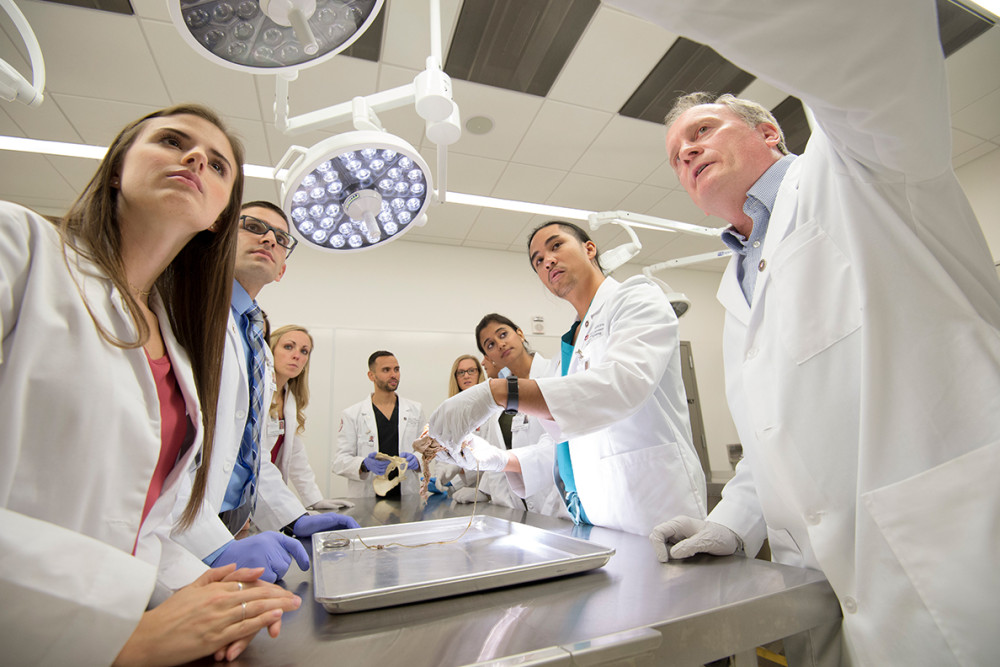WSU College of Medicine implements resuscitation quality improvement program
Wednesday, September 25, 2019

Media contact:
Christina VerHeul, Elson S. Floyd College of Medicine, 509‑368‑6850, christina.verheul@wsu.edu
SPOKANE, Wash.— Washington State University’s Elson S. Floyd College of Medicine is the first medical school in the nation to implement an enhanced CPR learning model from the American Heart Association and Laerdal Medical into its curriculum.
More than 200,000 in-hospital cardiac arrests occur annually in the United States with survival rates from adult in-hospital cardiac arrest at less than 26 percent. Patients who suffer a cardiac arrest must receive the highest quality CPR possible, which is known to be the cornerstone for survival. For decades, the CPR training standard for healthcare providers has been Basic Life Support, requiring participants to renew their course completion card every two years. However, studies show CPR skills can decay within three to six months following this training.
WSU’s medical school has taken a bold and innovative approach to medical education since its creation in 2015. Recognizing the importance of high-quality CPR competence, performance and delivery in saving more lives, the college has added another forward-thinking tactic to preparing future physicians with its adoption of RQI® 2020, (Resuscitation Quality Improvement®). The program, co-developed by the American Heart Association and Laerdal Medical and launched in January, will help the college’s students prepare for in-hospital cardiac arrest events. RQI 2020 is designed to assist clinical staff achieve sustained mastery of high-quality CPR skills and competence, resulting in improved patient outcomes.
The college rolled out the RQI 2020 program for third-year and future fourth-year medical students this fall, with one RQI station located on the Spokane campus and a portable station in rotation at three other campuses across the state.
“Being the first in the nation to provide the RQI 2020 program to our students further exemplifies how we are thinking years ahead to train and prepare our physicians to be healthcare leaders of the future,” said Dr. John Tomkowiak, founding dean at the Elson S. Floyd College of Medicine. “We are bringing innovative opportunities to students today to be on the leading edge of medical education, and ultimately healthcare, to improve the quality of patient care and help save more lives.”
Last July, the Association, the leading voluntary health organization devoted to a world of longer, healthier lives, and Laerdal Medical called for a new standard of care by shifting resuscitation practice from course training once every two years to verified competence for healthcare professionals. RQI 2020 provides a high-reliability platform for self-directed, simulation-based mastery learning and performance, which is implemented through “low-dose, high-frequency” hands-on CPR quality improvement sessions, in 10 minutes every 90 days. The program prepares clinicians to deliver high-quality CPR and verifies competency in Basic Life Support, Advanced Life Support and Pediatric Advanced Life Support through simulated skills sessions and eLearning simulations. The program also provides analytics that measure compliance.
“We are excited the Elson S. Floyd College of Medicine is implementing the RQI 2020 program and taking an early step to introduce its students to a new standard of resuscitation care – verified competence,” said Ted Duncan, American Heart Association executive director in eastern Washington. “The college’s adoption of RQI 2020 illustrates its commitment to creating a learning environment that is tech-forward and groundbreaking and making high-quality CPR competence a priority for its students.”
The college, which was created to fill critical healthcare gaps across the state of Washington, recruits and trains students to serve in rural and urban, underserved communities where they are needed most.
“Similar to the American Heart Association, we remain steadfast in serving communities and people who have little or no access to medical care,” said Dr. Chris Martin, director of simulation-based training and clinical assistant professor at the Elson S. Floyd College of Medicine. “We want to ensure our students are equipped with the skills, knowledge and competence to perform at the highest level during cardiac arrest occurrences; RQI 2020 is a perfect solution to help prepare them for better patient outcomes.”
To learn more about the Elson S. Floyd College of Medicine or the RQI 2020 program and the value it brings to healthcare, patient care and communities at-large, visit www.medicine.wsu.edu or www.rqipartners.com.
Find this release online at https://news.wsu.edu/2019/09/25/wsu-college-medicine-implements-resuscitation-quality-improvement-program/
A high resolution photo is available online at https://s3.wp.wsu.edu/uploads/sites/609/2019/09/WSUmedicalschool.jpg
Photo caption: The WSU College of Medicine has added another forward-thinking tactic to preparing future physicians with its adoption of an enhanced CPR and resuscitation learning model.